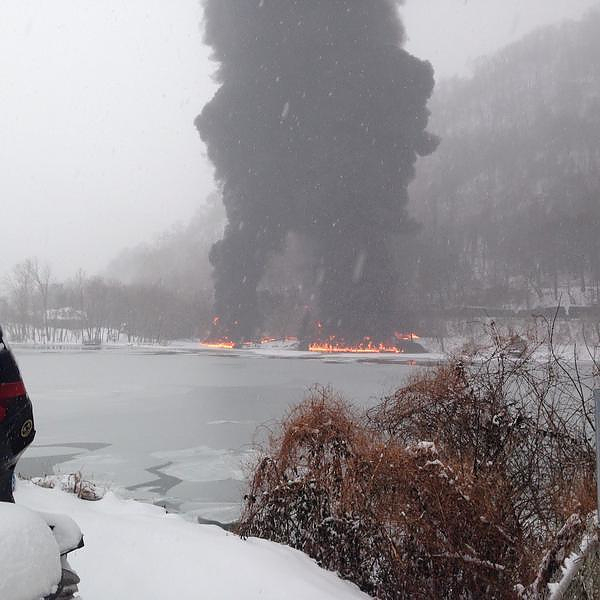Waterkeeper Alliance Calls for Immediate Action to Protect Communities from Dangers of Crude Transport by Rail in Aftermath of West Virginia CSX Train Derailment
By: Waterkeeper Alliance

West Virginia Headwaters Waterkeeper urges protection of communities through full public disclosure, as required in many states
February 17, 2015 — New York, NY — West Virginia Headwaters Waterkeeper, a Waterkeeper Alliance organization, is on the ground responding to the aftermath of yesterday’s CSX train derailment which resulted in explosions, fires, the evacuation of hundreds of families, suspension of business operations and closure of drinking water intakes due to the apparent spill of crude oil into the Kanawha River. West Virginia Headwaters Waterkeeper and Waterkeeper Alliance are deploying the organization’s Rapid Response Protocol to respond to the incident.
“We’re thankful that the explosions of highly volatile Bakken crude oil tankers did not cause any loss of life,” said Angie Rosser, West Virginia Headwaters Waterkeeper. “Ironically, this incident occurred on the same day the legislature held a public hearing to consider restoring drinking water protections for the Kanawha River. Hours later we were reminded of the vulnerability of our water supplies and our own safety.
Rosser cites the lack of disclosure requirements about what is being transported on the rails. “Our communities need to know what is being transported through the areas where people live and work and where our children go to school each day,” said Rosser. “West Virginia has refused to release rail transport information to the public. This needs to change immediately to protect our water and our communities.”
Waterkeeper Alliance organizations all over the country have been responding to increased CSX train derailments over the past five years utilizing the Rapid Response protocol. Most recently, Hurricane Creekkeeper John Wathen responded to the Aliceville, Alabama train derailment that resulted in 450,000 gallons of crude oil being released into a nearby wetland. Waterkeeper Alliance and Upper James Riverkeeper Pat Calvert were on the ground for the Bakken Crude Oil train derailment and fire that caused the evacuation of downtown Lynchburg, Virginia on the very same rail line as yesterday. The CSX derailment in Lynchburg spilled an estimated 30,000 gallons of Bakken crude oil into the James River. Neither the West Virginia Department of Environmental Protection or Environmental Protection Agency have released any estimates on the amount of Bakken crude oil that may now be in the Kanawha River and impacting drinking water systems of Montgomery and Cedar Grove.
“Federal officials continue to endanger the safety of our communities and our drinking water by failing to enact reasonable regulations for the rail transport of crude oil, which has increased 4000% in the last six years,” said Robert Kennedy, Jr., President of Waterkeeper Alliance. “Taking their signals from carbon tycoons, federal regulators are sitting on their hands while our rail infrastructure crumbles, bridges collapse and substandard tank cars derail and explode, incinerating homes, poisoning waterways and threatening the drinking water of millions of Americans. Over two frightening weeks, this greedy industry has been responsible for derailments in West Virginia, South Carolina and Ontario. Fires are still burning after the crashes in Ontario and West Virginia. It’s time for us to light a fire under federal Department of Transportation officials, and to let them know that they are working for American taxpayers and not the Koch brothers.”
The Waterkeeper Alliance Rapid Response Team initiative is an innovative solution that provides trusted and independent emergency response to disasters on our waterways. In a climate of lax federal regulations and extensive budget cuts to state departments of environmental conservation, the need for Waterkeepers to speak truth about the devastating impacts of water emergencies on communities has never been greater. West Virginia Headwaters Waterkeeper will continue to monitor the situation to ensure that proper clean-up, mitigation and enforcement is completed.
Contacts:
Tina Posterli, Waterkeeper Alliance, 516-526-9371, [email protected]
Angie Rosser, West Virginia Headwaters Waterkeeper, West Virginia Rivers Coalition, 304-437-1274, [email protected]
###
West Virginia Rivers Coalition, home of the West Virginia Headwaters Waterkeeper, is a non-profit statewide advocacy organization dedicated to drinkable, swimmable, fishable rivers. For information visit www.wrivers.org.
Waterkeeper Alliance is a global movement uniting more than 240 Waterkeeper organizations around the world and focusing citizen advocacy in issues that affect our waterways, from pollution to climate change. Waterkeepers patrol and protect more than 2 million square miles of rivers, streams and coastlines in the Americas, Europe, Australia, Asia and Africa. For more information please visit: www.waterkeeper.org